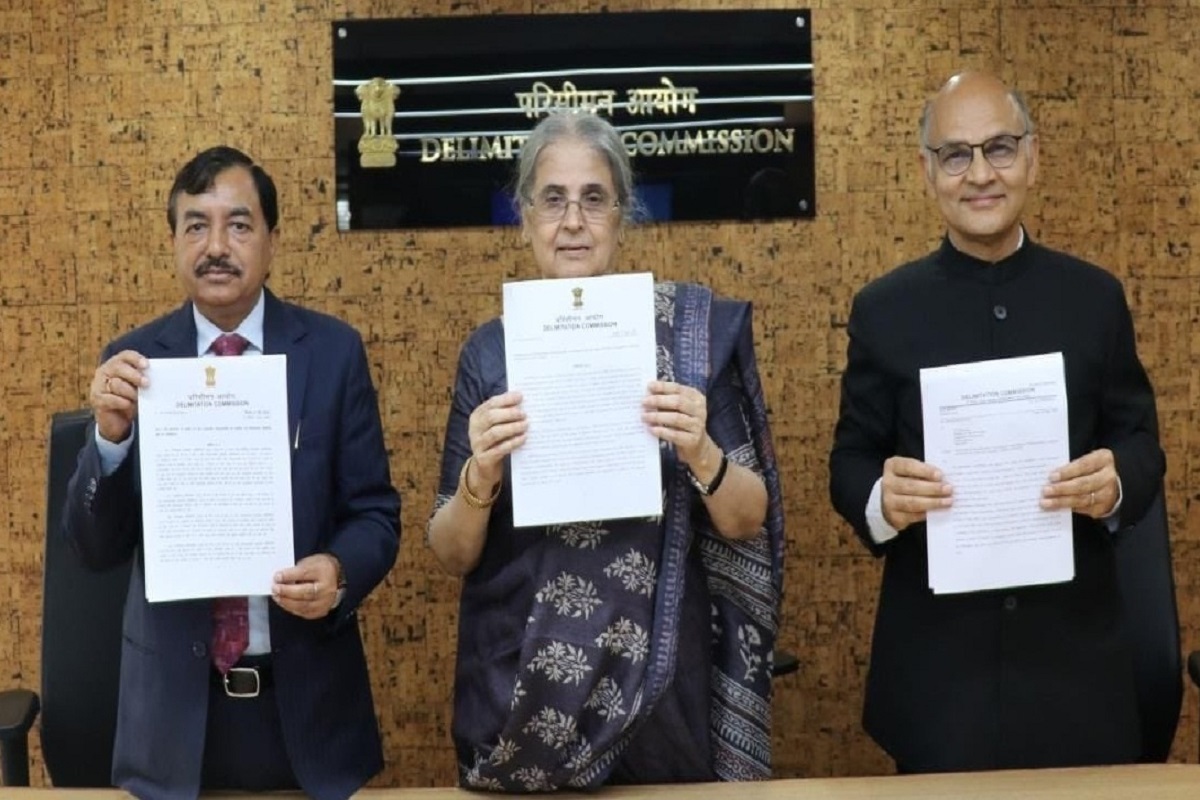LG calls effective for steps to wipe out terrorism from Jammu
Lt. Governor Manoj Sinha, on Thursday, stressed strengthening border security against asymmetric threats due to the porous border with riverine and difficult mountain ranges.
For the first time, nine Assembly Constituencies (ACs) have been reserved for the Scheduled Tribes, out of which, six are in Jammu region and three in Kashmir. The constitution of the erstwhile Jammu and Kashmir state had no provision for the reservation of seats for Scheduled Tribes in the Legislative Assembly.

Photo: IANS
The Delimitation Commission for Jammu and Kashmir on Thursday finalised the delimitation order and submitted it to the Election Commission of India wherein it has recommended 43 Assembly seats for Jammu division and 47 seats to the Kashmir region.
For the first time, nine Assembly Constituencies (ACs) have been reserved for the Scheduled Tribes, out of which, six are in Jammu region and three in Kashmir. The constitution of the erstwhile Jammu and Kashmir state had no provision for the reservation of seats for Scheduled Tribes in the Legislative Assembly.
Advertisement
As per the final Delimitation Order, out of the 90 Assembly Constituencies in the region, 43 will be part of Jammu region and 47 for Kashmir region keeping in view the provisions of Section 9(1)(a) of the Delimitation Act, 2002 and Section 60(2)(b) of Jammu & Kashmir Reorganisation Act, 2019, the Delimitation order said.
Advertisement
The six new Assembly constituencies in the Jammu region are expected to be carved out from Rajouri, Doda, Udhampur, Kishtwar, Kathua, and Samba districts.
The one new seat for the Kashmir Valley would reportedly be carved out from the Kupwara district.
As of now there are 46 seats in Kashmir region and 37 seats are in Jammu division.
“There are five Parliamentary Constituencies in the region. The Delimitation Commission has seen the Jammu & Kashmir region as one single union territory. Therefore, one of the Parliamentary Constituencies has been carved out combining the Anantnag region in the Valley and Rajouri and Poonch of Jammu region. By this reorganisation each Parliamentary Constituency will have an equal number of 18 Assembly Constituencies each,” the order further said.
The Commission headed by Justice Ranjana Prakash Desai, (a retired Judge of the Supreme Court of India), and Chief Election Commissioner Sushil Chandra, and Election Commissioner of Union Territory of Jammu and Kashmir K.K. Sharma as Ex-Officio members of the Delimitation Commission met Thursday to finalise the Delimitation Order for the Union Territory of Jammu & Kashmir.
The Commission also said that with regard to the relevant provisions of the Constitution (Article 330 and Article 332) and sub-sections (6) and (7) of Section 14 of the Jammu and Kashmir Reorganisation Act 2019, the number of seats to be reserved for the Scheduled Castes (SCs) and Scheduled Tribes (STs) in the Legislative Assembly of the Union Territory of Jammu and Kashmir was worked out on the basis of 2011 Census. Accordingly, the Delimitation Commission has reserved nine ACs for STs for the first time and seven for SCs.
The Commission has changed the names of a few Assembly Constituencies after hearing from the people and representatives of the political parties. These name changes included naming Tangmarg-AC as Gulmarg-AC, Zoonimar-AC as Zaidibal-AC, Sonwar-AC as Lal Chowk-AC, Padder-AC as Padder-Nagseni-AC, Kathua North-AC as Jasrota-AC, Kathua South-AC as Kathua-AC, Khour-AC as Chhamb-AC, Mahore-AC as Gulabhgarh-AC, Darhal-AC as Budhal-AC, etc.
In addition to these, there were many representations pertaining to shifting of Tehsils from one AC to another and some of them which Commission found logical were accepted, such as shifting of Tehsil Srigufwara from Pahalgam-AC to Bijbehara-AC, shifting of Kwarhama and Kunzar Tehsils to Gulmarg-AC and redrawing Wagoora-Kreeri-AC having Kareeri and Khoie tehsils and part of Wagoora and Tangmarg tehsils, shifting of Darhal Tehsil from Budhal-AC to Thannamandi-AC. Additionally, there were some requests for minor changes in the territorial jurisdiction of proposed ACs, which were thoroughly analysed in the Commission and a few of them, which were logical, have been incorporated in the final Order.
The Delimitation Commission was constituted by the Centre on March 6, 2020 in exercise of powers conferred by Section 3 of the Delimitation Act, 2002 (33 of 2002), for the purpose of delimitation of Assembly and Parliamentary Constituencies in the Union Territory of Jammu & Kashmir.
The Commission associated in its work, five members of the Lok Sabha elected from the UT of Jammu and Kashmir. These Associate Members were nominated by the Lok Sabha Speaker.
The Delimitation Commission was entrusted with the work of delimiting the Assembly and Parliamentary Constituencies in the UT of Jammu and Kashmir on the basis of 2011 Census and in accordance with the provisions of Part-V of the Jammu and Kashmir Reorganisation Act, 2019 (34 of 2019) and the provisions of Delimitation Act, 2002(33 of 2002).
Advertisement